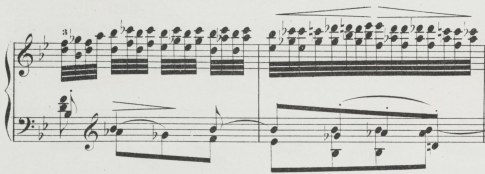Hearing Liszt’s “Feux follets” at Alice Tully Hall — it crossed my mind that it was the most accomplished performance of the étude ever played!
This solo recital was won by the pianist as part of a competition prize. Tully Hall was mostly empty. No critics and no bloggers were there to document this considerable piano-playing achievement. And that makes sense — it wasn’t “news.”
It may be puzzling that today’s highly accomplished, unprecedented classical music playing isn’t met with adulation, from most listeners to music. Already in 1979, Roland Barthes could write: “For today’s pianist, enormous esteem but no fervor.”
Reading accounts of reactions to Liszt’s playing, or Paderewski’s, leaves me somewhat uncomprehending. With fainting females and teams of white horses conveying the star, “Lisztomania” resembles “Bieber fever” more than anything in today’s classical music culture.
 Overwhelmingly daunting when it appeared, “Feux follets” represents a pinnacle of 19th-century double-note playing. Jeffery Biegel’s excellent command of this etude could still provoke discussion (or envy) at Juilliard 30 years ago. Much more recently, hearing a young prospective student toss off “Feux follets,” my colleague Patricia Zander whispered in my ear, “You know that piece used to be difficult!”
Overwhelmingly daunting when it appeared, “Feux follets” represents a pinnacle of 19th-century double-note playing. Jeffery Biegel’s excellent command of this etude could still provoke discussion (or envy) at Juilliard 30 years ago. Much more recently, hearing a young prospective student toss off “Feux follets,” my colleague Patricia Zander whispered in my ear, “You know that piece used to be difficult!”
We are making a mistake if we consider music — even virtuoso piano pieces — to be an achievement. Far better to recognize music as a transaction, a group activity. The receivers are integral to the impact and even the content of the art!
Liszt was an early adopter, exploiting the high Indutrial Revolution technology that was the modern piano. To redo the task now, the letter of the task, is not the same thing at all.

It’s interesting to read this just a few days after seeing Anthony Tommasini’s article in the Times about the unprecedented level of virtuosity among younger pianists. Paradoxically, the greater the technical achievement, the less it matters to audiences.
I think that these piano athletes and their mentors have confused means with ends: piano technique ought to be at the service of music and not an end in itself. The Olympic creed “faster, higher, stronger” has been co-opted by pianists driven by the desire to do well in competitions, which has had the effect of reducing the repertoire to a small stable of over-played warhorses. Or to use a different metaphor, the vast repertoire for piano has been boiled down into a few Olympic events — the ubiquitous Rachmaninoff Third Concerto, Trois Mouvements de Petroushka, and Feux Follets to name a few.
Actual audiences, as opposed to competition juries, long for performers who can convey intimacy, humor, gentleness, and charm as well as brilliance and speed. Listeners are jaded, if not beaten into submission, by too much loud and fast playing. That’s one reason why they stay away.
see an earlier pre-Tommasini PianoMorphosis post:
http://www.artsjournal.com/pianomorphosis/2009/07/piano_darwinism.html
discusses the “four-minute mile” and Busoni’s “pianistic Darwinism”
Back in 1826, when Liszt’s audiences responded with fervor to Feux Follets, the piece had a precious quality it can never have today, no matter how it is played. It was new.